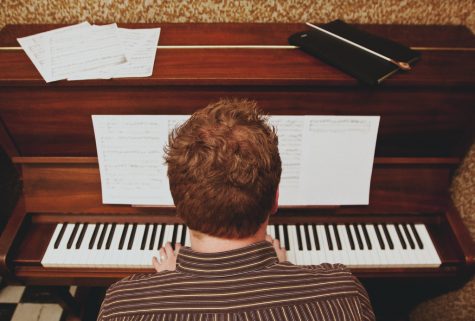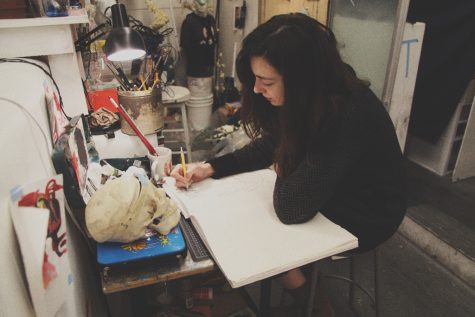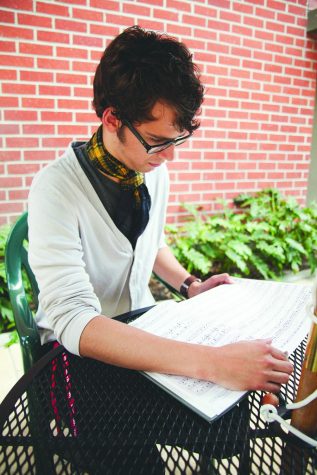Written by Sarah Jean
Discipline. For most, the word means self-denial and willpower: losing sleep to study for an exam, remembering to pay the phone bill on time, or passing by the display case lined with plump swirly-top cupcakes.
Afterwards, it’s the ‘A’ on an exam, the perfect credit score, or the clothes that fit that make the small triumphs seem worthwhile. Few enjoy the process of disciplining themselves. It seems a bit monastic to actually appreciate the solitary triumphs that receive little attention from others. What if those solitary moments of discipline, not the end results, were actually the most rewarding part?
The lives of artists and monks are often comparable, says Katherine Long, a Biola senior art major. Creative acts are primarily solitary processes, so confinement and self-denial seem tied to both artists and monks. For creators, like artists and musicians, the public acknowledgement of their work seems a flicker of time compared to the hours on hours spent preparing in studios or practice rooms by themselves. A composition that an audience spends a mere six minutes listening to likely took the composer four to six months to write, explains Joel Balzun, a junior music major. A full-length opera may even take two years to compose.
“If you aren’t diligent, then composers just kind of drop out,” Balzun says. A piece of music takes such an extended time to create, that composers often have to take a break to refresh their mind and their sonic palate. While the audience might perceive only one homogeneous hum, the composer has spent days creating a unique voice for each instrument. Thus, composers need a broad knowledge of different instruments. Balzun’s own one-man band consists of the piano, baritone, trombone, violin, viola and his own voice.

Tyler Wigglesworth, a junior music major with an emphasis in voice, studies the communication of music rather than its creation.
“You can never turn off musical training,” he says. The information students learn in one class bleeds right into the next class session, he explains. “It really does come down to discipline and trying to build that discipline right away.” During his freshman year, Wigglesworth said he tucked information in his short-term memory and now he often has to go back to re-learn it. “I wish I would have devoted more things to heart instead of devoting them to the test,” he admits.
Music and art go beyond just poring over books and papers, demanding instead that the creator train his or her body’s senses and perception skills. As Katherine Long turned through the pages of her sketch book, which were covered with nimbly-formed faces, she explained that a lot of art is “taking the time to actually look and record it and not letting it pass by.”
An artist has the pleasure of really studying the quirks, the colors and the unique characteristics of the elements that most others rush past. “Beautiful things are exciting,” says Long. “When you create something, you’re making the world more beautiful in your own little way.”
Wigglesworth talks about the way music also teaches you to be in tune to your surroundings. Despite the fact that his emphasis is in voice, Wigglesworth says his ears are often what get the most training. Because of this training he has a sharper perception of the music around him.
“I hear things, things that had always been there, but I hadn’t recognized,” smiles Wigglesworth. He used the example of catching an off-key strain of music. Those moments, he says, put a smile on his face. It’s a kind of thrill that the artist gets to experience, a sense of discovery.
Balzun and Wigglesworth are both encouraged by the accomplishments of others in their field. Composers are continually listening to “masters of the instrument,” as Balzun puts it, “people who are at the top of the game or at the top of the totem pole.” For Balzun, fellow-Canadian and professional composer Alexina Louie is at the height of her game. Having played many of her pieces, he described how meeting Louie face-to-face illuminated why her music was “free of barriers that composers sometimes put on themselves.”
Meeting Louie revealed to Balzun that a composer actually solidifies a piece of themselves to share with others through their work. The captured music is really an expression, a mood, a thought, an intangible element of the mind that is caught and caged within the staff.
Anytime you hear a piece played by someone, Balzun suggests, you just have to muse over the fact that a while ago, the piece didn’t even exist.
Wigglesworth notes the remarkable process of sight-reading, where the inky notes become strains of music with no instrument but the eyes to play them. At Biola, Wigglesworth often finds himself surrounded by music majors who are excellent sight-readers, though he himself still struggles because of the little classical training he had in that area.
“It can be the most discouraging thing because you’re surrounded by people that are so good” he says. Yet, like Balzun, Wigglesworth says seeing the skill of others is also encouraging. Their proficiency urges Wigglesworth to continue his pursuits — and their skills are a testament to the achievements discipline makes possible.
By investing time and energy in yourself, you validate your own acknowledgement of your abilities. This is why discipline will always remain a paramount virtue: it connects what could be with what actually is. It shows respect for the art and the respect for the potential in oneself.

“You can be creative all you want,” Long says, “but if you don’t work hard there’s nothing to show for it.” When you are being judged by what you create, pure competitiveness entwines with genuine love, Long explains. The only way that an artist can display his or her talent and share the beauty that they perceive around them is through diligence. Besides this, Long continues, the genuine love of a task can bring pleasure. She uses the example of a night she spent drawing a self-portrait that was due the next day: “I was working all night on it and I worked really hard.
My feet were hurting, my legs were crossed, my eyes were hurting, but it was due.” Despite all of the pain, Long still laughs about it. “It was still really enjoyable.” When mind and motivation become fully engrossed in a task, a person finds a pure joy in the experience. Psychologists have written extensively about this process, which they call “flow.” Flow happens when you are focused on the task and find joy in the working — the untouchable connection to the labor that brings satisfaction. Balzun tells of how, while composing, he paces the floor and sings to himself as ideas get thrown around in his head.

“Doing something physically or kinetically just helps me draw out creativity somehow,” he says. These moments that artists spend alone — pacing the floors to capture the perfect phrasing of music or scratching away at a likeness of themselves — these are the moments that truly matter.
“Every time you have a piece premiered, it is a fitting end to the journey,” Balzun says. This is the very essence of enjoying self-discipline: not regarding the applause or the enthralled faces as the reasons for the endeavor, but rather as the perfect closing of it.





